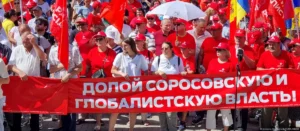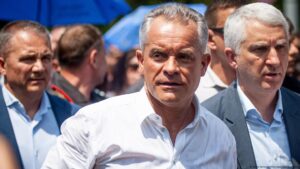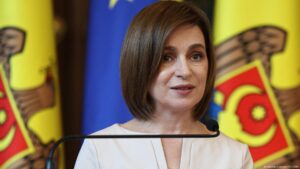The Republic of Moldova is set to hold a crucial parliamentary election in late September. Even before the official campaign begins, Russia has launched attacks on multiple fronts.

The Republic of Moldova is set to hold a crucial parliamentary election in late September. Even before the official campaign begins, Russia has launched attacks on multiple fronts.
Moldova Faces Hybrid Threats Ahead of Crucial Elections
In recent weeks, police in the Republic of Moldova have been issuing urgent warnings via their Telegram channel.
Authorities have repeatedly cautioned citizens about the spread of fake news on social media, urged them to reject electoral bribes, and reported the arrests of individuals paid to stage demonstrations. Most notably, the police recently released a video revealing how Russia is allegedly purchasing large numbers of votes through an app called “Taito.”
Following a meeting of the Supreme Security Council last week, President Maia Sandu described Russia’s actions as an “unprecedented” attempt to interfere in the upcoming September 28 elections, warning that Moscow aims to once again assert control over the country.
What’s at Stake?
This vote will decide whether Moldova continues on its democratic path toward European integration, or whether pro-Russian parties seize power and steer the country back into Moscow’s sphere of influence. Despite the campaign period not officially beginning, events are escalating rapidly.
A Testing Ground for Russian Hybrid Tactics
Russia appears to be using Moldova as a testing ground for pre-election hybrid warfare strategies. The goal: to undermine trust in Moldova’s democratic institutions and destabilize the political landscape through calculated acts of sabotage.
These tactics include orchestrated public protests, large-scale vote buying—both within Moldova and among its diaspora—disinformation campaigns on social media, and a growing use of misleading AI-generated content. In addition, Moldova’s digital infrastructure has faced repeated cyberattacks. Meanwhile, Russia has also increased missile and drone activity through Moldovan airspace en route to Ukraine, heightening fear of conflict among Moldovans.
Together, these efforts have elevated Moldova’s national election into an event of broader European significance.
Plahotniuc’s Arrest Sparks Concerns Over Russian Interference
The recent July 27 arrest of fugitive Moldovan oligarch Vladimir Plahotniuc at Athens airport has generated significant attention. Moldovan authorities have pursued Plahotniuc since 2019 on multiple charges, including his suspected involvement in the infamous “Billion Dollar Heist” that drained Moldova’s banking system between 2012 and 2014.
Adding to the alarm, the Latvia-based investigative outlet The Insider reported last month that Plahotniuc had made several trips to Russia and Belarus in recent months, where he allegedly met with Dmitry Kozak—an influential figure in the Kremlin and a long-time confidant of Russian President Vladimir Putin.
In Moldova, Kozak’s name is synonymous with alarm. He authored the controversial 2003 “Kozak Memorandum,” which proposed transforming Moldova into a loose federation—a move widely seen as a Kremlin strategy to retain influence. That plan was ultimately rejected by then-president Vladimir Voronin, a decision that embarrassed Moscow and left lasting resentment among Russian leaders.
According to the report, Plahotniuc’s meetings with Kozak focused on reactivating his old political and economic networks within Moldova—potentially to aid Moscow in pulling the country back into Russia’s orbit.

Three Decades of Russian Political Aggression
Despite Moldova’s small size and limited economic significance—home to just 3.5 million people and largely agrarian—Russia has relentlessly targeted the country with neo-imperial aggression for over thirty years. It was in Moldova, during the spring of 1992, that Russia launched its first post-Soviet military campaign against an independent state. The justification used then—protecting Russian-speaking minorities from an allegedly fascist national government—would become a recurring pretext in future Russian interventions.
To this day, the Kremlin supports a separatist regime in Moldova’s Transnistria region, run by mafia-linked Russian intelligence operatives. Moscow continues to violate international law by maintaining troops and stockpiles of weapons in the region. Over the years, Moldova has also been exploited financially, with its banking system used as part of the infamous “Russian Laundromat” operation to launder billions of dollars globally. In addition, Moscow has repeatedly wielded energy as a weapon, threatening the country by cutting off gas supplies.
Democratic Gains and Persistent Challenges
In mid-2019, Moldova appeared to make a decisive turn toward democracy. After years of political turbulence, voters elected Maia Sandu—a popular anti-corruption advocate—as prime minister and, eventually, president. Her pro-European Action and Solidarity Party (PAS) achieved a parliamentary majority in 2021, pledging sweeping legal and economic reforms. Progress, however, has been uneven.

Moscow’s Shadow Network
Several factors have hampered Sandu’s reform agenda. Moldova continues to grapple with deep-rooted corruption and the long-term effects of a mass brain drain. The unresolved conflict in Transnistria persists, while EU efforts to help Moldova achieve energy independence from Russia have been slow. Compounding these issues is a relentless barrage of Russian propaganda. One of the Kremlin’s most damaging narratives falsely claims that the EU and NATO are conspiring to drag Moldova into the war in Ukraine—ironically, a war started by Russia itself.
The scale of Russian influence and Moldova’s internal vulnerabilities became clear in last year’s presidential election, which coincided with a referendum on EU integration. Although Sandu ultimately secured re-election after a second-round vote, the referendum narrowly passed. Just before the election, Moldovan authorities revealed they had uncovered a covert operation that had succeeded in buying up to 300,000 votes—an alarming sign of the reach and effectiveness of Moscow’s interference.
Ilan Shor and the Kremlin’s Shadow Campaign
The vote-buying network uncovered in Moldova was reportedly orchestrated by Ilan Shor, a Moldovan-Israeli businessman with a long history of controversy. Shor is widely believed to have played a central role in the notorious “Billion Dollar Heist” before fleeing the country—initially to Israel, and later to Russia—alongside fellow oligarch Vladimir Plahotniuc. Although multiple political parties founded by Shor have since been banned in Moldova, he continues to exert political influence from abroad. In the lead-up to Moldova’s September elections, Shor launched a new political coalition from Moscow, branding it the “Victory” alliance. However, in July, Moldova’s Central Election Commission (CEC) disqualified the alliance from participating in the vote.
The ‘Patriot Bloc’: Putin’s Second Front
Attention is now shifting to what analysts describe as Russian President Vladimir Putin’s “second front” in Moldova: the pro-Russian “Patriotic Bloc,” a coalition of four parties expected to contest the September election. Among its leading figures is former President Igor Dodon. Though his party identifies as Socialist, its positions are closely aligned with Kremlin-style right-wing populism—much like the other three parties in the bloc. Tellingly, the bloc’s leaders visited Moscow for consultations before officially registering for the parliamentary vote. Their campaign platform is centered around one primary goal: restoring close ties with Russia.
Kremlin Denials Ring Hollow
Despite mounting evidence of interference, the Kremlin continues to deny involvement. When President Maia Sandu publicly accused Russia of orchestrating a large-scale campaign to manipulate Moldova’s election, Kremlin spokesperson Dmitry Peskov dismissed the allegations, stating that Russia “does not interfere in the internal affairs of other countries.”
